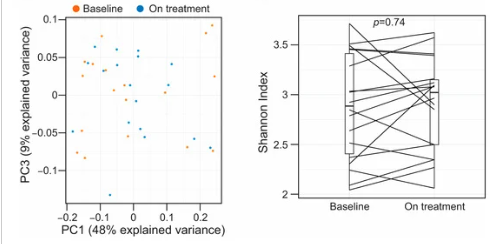💡 Atherosclerotic cardiovascular disease (ASCVD) is closely linked to gut microbiota, influencing the production of bioactive metabolites. While previous studies identified specific bacterial profiles associated with ASCVD, the impact of PCSK9 inhibitors on gut microbiota remains unclear. In this observational study, researchers explored the alterations in gut microbiota and metabolites following alirocumab, a PCSK9 inhibitor, in ASCVD patients.
📍 Gut Microbiota Composition in ASCVD: Patients with ASCVD exhibit distinctive gut bacterial profiles, characterized by an enrichment of 𝘗𝘴𝘦𝘶𝘥𝘰𝘮𝘰𝘯𝘢𝘥𝘰𝘵𝘢 and a reduction in SCFA-producing bacteria.
Clinical heterogeneity and long-term statin therapy in the cohort introduced variability in ASCVD-related fecal bacterial profiles.
Contrary to other cholesterol-lowering medications, PCSK9 inhibition did not induce taxonomic changes in the gut microbiota, challenging the association between ASCVD and fecal bacterial communities.
📍 Metabolites Implicated in ASCVD Pathophysiology: Gut microbiota-produced metabolites, Short Chain Fatty Acids (SCFAs) and Bile Acids (BAs), play crucial roles in ASCVD development.
Both SCFAs and BAs influence lipid and cholesterol metabolism, potentially preventing atherosclerosis and maintaining cardiovascular function.
PCSK9 inhibition did not correlate with circulating levels of SCFAs, but it was associated with an elevated excretion of BAs in feces.
📍 Association Between PCSK9 Inhibition and Bile Acids: Alirocumab treatment led to an increased concentration of secondary BAs in feces, aligning with findings from previous animal models and knockout mouse studies.
Elevated fecal BAs were correlated with the reduction in plasma LDL-c levels induced by alirocumab, suggesting a compensatory mechanism.
The antimicrobial properties of BAs did not result in taxonomic changes in the gut microbiota, highlighting a specific effect associated with PCSK9 inhibition.
📍 PCSK9 inhibition with alirocumab in ASCVD patients did not alter gut microbiota composition but led to an increased concentration of fecal BAs. The association between elevated BAs and reduced LDL-c levels suggests an additional mechanism contributing to the cholesterol-lowering effects of PCSK9 inhibition.
Link to the article : http://tinyurl.com/yz55nm8t
